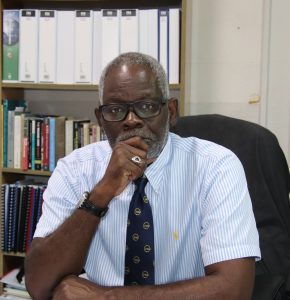

Prof Nii-K Plange.
Fiji National University (FNU), will partner with the Association of Commonwealth Universities (ACU) to co-host the Commonwealth Climate Resilience Network webinar which aims to discuss and highlight climate-related research and resilience work across member countries. The webinar will also discuss and explore opportunities for funding within the Global Challenges Research Fund of the UK.
The Network was established by ACU in partnership with FNU, the University of the South Pacific (USP) and the University of the West Indies (UWI), to link universities directly affected by climate change with those that have expertise in building resilience.
The webinar will provide a platform for sharing regional perspectives on research themes such as systemic risk, resilience and development, and equitable international partnerships.
The date of the webinar is expected to be released soon and will be open to ACU members.
FNU Centre for Interdisciplinary Studies and Sustainable Development Director, Professor Nii-K Plange, said the online event would provide the opportunity to establish international collaboration on climate change resilience research with other partners, particularly those from Small Island States (SIS) that have vested interest due to the catastrophic impact of climate change.
“For us at FNU, and especially the Climate Change Programme team, and others with interest in aspects of Climate Change, research funding is critical especially within the context of COVID-19,” he said.
“Bearing in mind that in Fiji, particularly, about 75 percent of the population live in coastal areas that are exposed to sea-level rise and are at risk of losing life and livelihood.”
“The coastal areas are also very significant in Fiji’s development. Tourism, agriculture, fishing and manufacturing industries are all located in the coastal areas and are at severe risk.”
“Carefully designed research – some informed by interdisciplinary orientation with appropriate, and indeed at times, innovative research tools – and collaboration with those from other institutions can be an exciting as well as resourceful experience.”
“For us in the Pacific, we would need to reframe climate change-related research broadly from the perspective of disaster and disaster risks and mitigation.”
Prof Plange said this was because of the enduring triple threat of hurricanes, climate change and now a pandemic.
He encouraged those in the climate change or related fields to register and participate in the upcoming webinar.